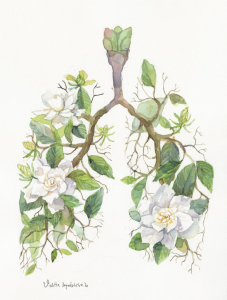 Many of the usual recommendations for wildfire smoke are in conflict with the advice being given to contain the current viral pandemic. It can be confusing!
Many of the usual recommendations for wildfire smoke are in conflict with the advice being given to contain the current viral pandemic. It can be confusing!
One thing certain is that lung health is of utmost importance right now.
Wildfire smoke and the virus both damage the deep area of your lungs where oxygen enters the blood and carbon dioxide exits, the alveoli.
Microparticles in wildfire smoke, which are invisible to the naked eye, evade your body’s natural filtering mechanisms to enter the lungs directly. This can cause lasting damage to your deep lung tissue. In the deep lung, carbon dioxide is exchanged for oxygen at the alveoli.
Microparticles can also enter the bloodstream at the alveoli and damage other areas of the body. The virus also enters via the nose and travels to the lungs where it binds with receptors on alveolar endothelial type 2 cells. You can help protect your lung tissue by breathing clean air.
A dozen ways to take care of your lungs right now
- Stay inside – You’ve likely spent a lot of time in your house in the last five months, but your best defense is to hang out there a little longer with the windows and doors closed during periods of poor air quality.
- Invest in a HEPA-filtered air purifier – HEPA filters help remove any microparticles from wildfire smoke that may creep into your home.
- Check the air filters in your home AC & heating units, and in your car – Check your filters. If you haven’t changed them since the last wildfire season, they likely need to be replaced.
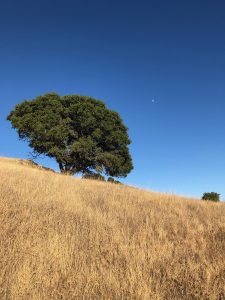 Support your lungs and liver with NAC – N-acetyl-cysteine (NAC) is a wonderful supplement to support your lung health. It helps strengthen mucous membranes in your lungs, which serve as a physical barrier to incoming viruses and microparticles. NAC is also a precursor to glutathione. Your body needs glutathione for Phase I and Phase II liver detoxification, but most of the time your body doesn’t absorb glutathione effectively. By supplementing with high-quality NAC, you help your body produce more glutathione and detoxify more efficiently. I recommend Pure Encapsulations NAC in the clinic or you can purchase it through my online pharmacy.
Support your lungs and liver with NAC – N-acetyl-cysteine (NAC) is a wonderful supplement to support your lung health. It helps strengthen mucous membranes in your lungs, which serve as a physical barrier to incoming viruses and microparticles. NAC is also a precursor to glutathione. Your body needs glutathione for Phase I and Phase II liver detoxification, but most of the time your body doesn’t absorb glutathione effectively. By supplementing with high-quality NAC, you help your body produce more glutathione and detoxify more efficiently. I recommend Pure Encapsulations NAC in the clinic or you can purchase it through my online pharmacy.- Enjoy any good air quality as it rolls through town – Marin has been lucky enough to enjoy a few breaks in the bad air quality. Make use of that time to open up your house and cool it down. When the air quality is rated as “good,” get outside and exercise to lung capacity.When you exercise to the point of breathing hard in good air quality, it will help keep your lung tissue healthy. As you exercise, your muscles release myokines, a chemical signal that’s integral to immune health. Also, movement can help improve your mood and get you out of the house. Try exercising indoors when the air quality is unhealthy. PurpleAir, AirNow and the Bay Area Air Quality Management District
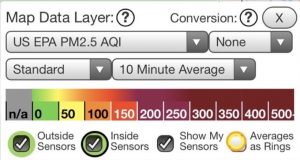 are all good resources to check the air quality in your neighborhood. If you’re going to compare sites, be sure to switch your settings on Purple Air from “None” to “LRAPA.” This will allow you to view measurements in units comparable to AirNow and Bay Area Quality Management District. Otherwise, the Purple Air numbers will always be higher.
are all good resources to check the air quality in your neighborhood. If you’re going to compare sites, be sure to switch your settings on Purple Air from “None” to “LRAPA.” This will allow you to view measurements in units comparable to AirNow and Bay Area Quality Management District. Otherwise, the Purple Air numbers will always be higher. - Eat your fruits and veggies – Diet is an important aspect of maintaining your health in Chinese and Western medicine. Eating a diet rich in fruits and vegetables helps reduce inflammation. As we are learning, the virus thrives in inflamed hosts. Lowering your inflammation levels may help reduce your chances of contracting a severe case. Leafy greens also help support your liver in detoxing your body from wildfire smoke. If you don’t want to brave the Marin Farmers Market mid-pandemic, consider getting a farm box from Conscious Kitchen instead.
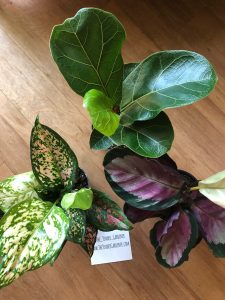 Buy some houseplants – If you haven’t already cultivated your houseplant collection over Shelter-in-Place, this a great time to start! Plants not only produce oxygen, they also filter toxins out of the air. Plus, they can lift your mood on a gloomy, smoky day. Please shop from your favorite locally-owned nursery and support local businesses.
Buy some houseplants – If you haven’t already cultivated your houseplant collection over Shelter-in-Place, this a great time to start! Plants not only produce oxygen, they also filter toxins out of the air. Plus, they can lift your mood on a gloomy, smoky day. Please shop from your favorite locally-owned nursery and support local businesses.- Considering buying an air quality monitor – This allows you to see what the air quality is in your home. It can help you gauge the effectiveness of your air filters so you can take steps to improve your air quality. PurpleAir and Awair both offer sensors that can be used indoors.
- Wash your hair – Just like when you have allergies, it’s important to wash your hair often. That way you’re not breathing the particles that have landed on your head throughout the day.
- Change your sheets – Again, as with allergies, changing your sheets weekly and your pillowcase daily will reduce your exposure.
- Nasal rinse – Your sinuses filter some gunk out of the air, so help it leave your body. Two of my favorite ways to clean out the nasal sinuses are using something like Vicks Sinus Inhaler or a xylitol-based nasal spray like X-Clear. If you suffer from chronic sinus infections, you might consider adding a drop of grape seed extract to your steamer or neti pot. Often there is a fungal component to chronic sinus infections, and the grape seed extract helps kill that off.
- Get lots of sleep – Your body repairs itself while you sleep. Make sure to budget some extra time for shut-eye.
Perspective on conflicting recommendations for wildfire smoke and the virus
When recommendations to prevent viral spread and mitigate health risks due to wildfire smoke conflict, what is a person to do? The best you can.
- Recycled air or fresh air? In case of wildfire smoke it is recommended that you shut off fresh air intake and breathe recycled air when you use a home air conditioner or drive your car. However, the role of ventilation and fresh air in preventing community spread of the virus is key. For this reason, I have been practicing with my clinic windows open and and my AC off since May. With the extreme heat and danger posed by wildfire smoke, I have decided to close my window and turn on my AC, which blows half fresh and half recycled air.
- N95 or cloth mask? As you likely know from wildfire seasons past, N95 and P100 masks are the preferred way to filter out wildfire particulate matter. However, these masks are in short supply and do not meet the current Marin Health and Human Services requirements. Current county regulations prohibit wearing masks with valves, such as N95, in public because they do not contain the respiratory droplets that spread the virus. Cloth masks, while effective at stopping the spread of the virus from person to person, do not filter out microparticles from wildfire. If you have an N95, you can
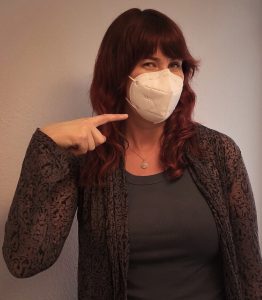 wear a surgical or cloth mask over it and be in compliance with county ordinances. Or if you’re going out and won’t be interacting with people outside your pod (like driving your car), you can forgo the second layer. If you only have cloth masks at this time, continue to wear them.I encourage you to order a KN95 mask. Like an N95, it filters out 95% of microparticles, but has no valve, so you can wear it in public. You can purchase a KN95 mask like I wear at the office online. Regardless of what type of mask you have available to you, make sure it fits snugly on your face. Gaps mean you’ll be breathing unfiltered air and reducing the efficacy of your mask.
wear a surgical or cloth mask over it and be in compliance with county ordinances. Or if you’re going out and won’t be interacting with people outside your pod (like driving your car), you can forgo the second layer. If you only have cloth masks at this time, continue to wear them.I encourage you to order a KN95 mask. Like an N95, it filters out 95% of microparticles, but has no valve, so you can wear it in public. You can purchase a KN95 mask like I wear at the office online. Regardless of what type of mask you have available to you, make sure it fits snugly on your face. Gaps mean you’ll be breathing unfiltered air and reducing the efficacy of your mask.
Learn more
About acupuncturist Katharine Chaney
Coping with stress and anxiety
